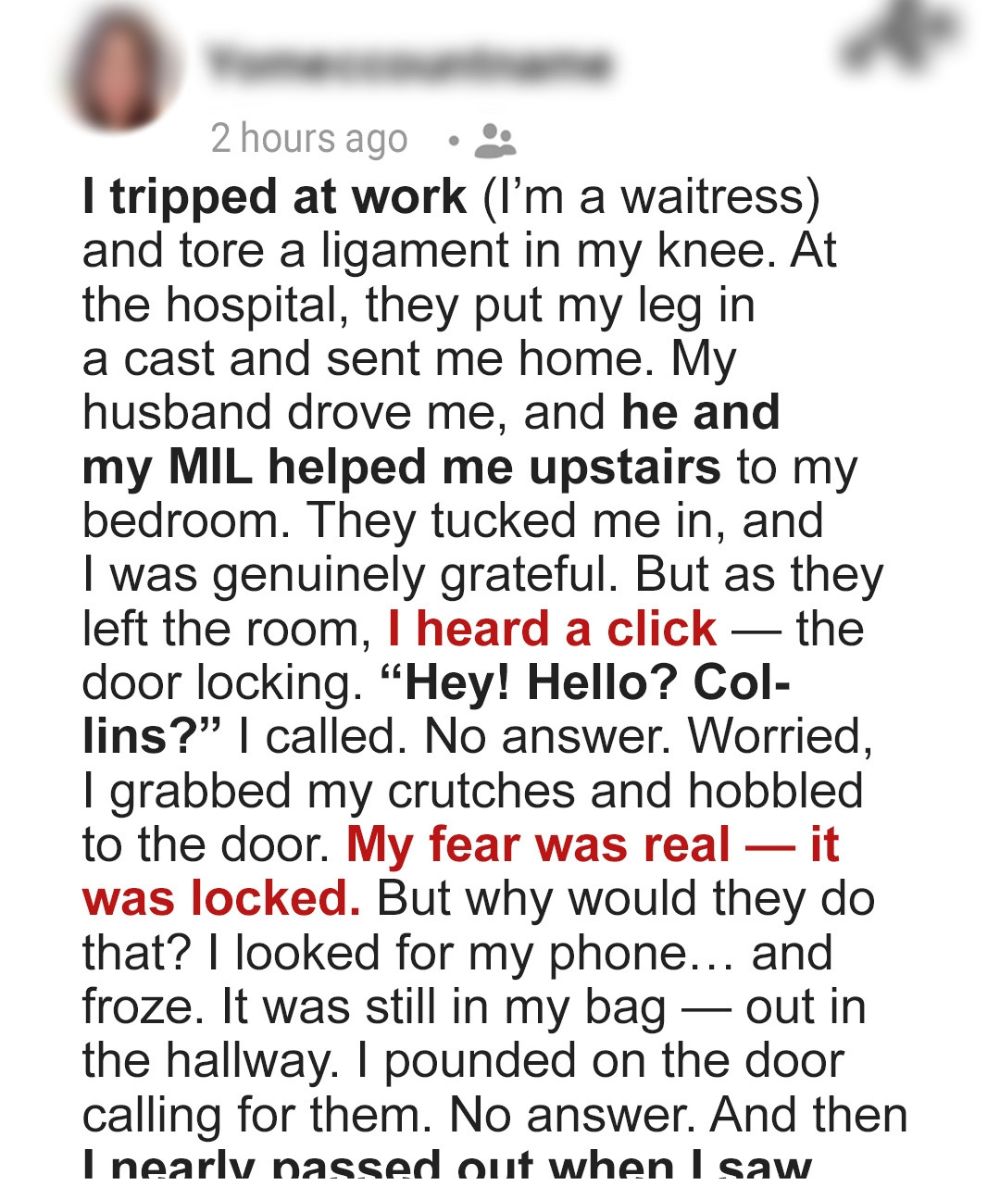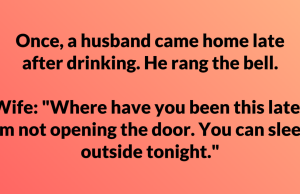
I believed I was marrying the most thoughtful man I had ever known. Turns out, I was headed into a house where “help” meant slavery, “love” meant control, and a shut door marked the difference between sane and betrayal.
I met Collins when I was 28, knee-deep in tension and marinara sauce, juggling plates and faking grins during the night shift at a crowded Italian restaurant in town. He wasn’t flamboyant, with no fancy watches or sleek lines.

Just a man with lovely eyes and a sweet grin who sat in the same corner seat every Thursday, tipping like he was saving the world one server at a time.
“You ever sleep?” he inquired, smiling as I replenished his iced tea. “Sleep is a myth,” I quipped. “I survive off espresso and spite.”
He laughed as though I had said something important.
And he remembered weeks later when I mentioned that my cat, Pickles, was sick. “How’s Pickles doing?” he inquired casually, as if it were the most natural thing in the world to recall a waitress’s cat.
Then came the night, and the sky opened up with thunder and sheets of rain. My shift ended, my bus was running late, and there he was, waiting in his ancient Toyota with the window down.
“Need a ride?” he said, his voice calm and unassuming.
I said yes.
He did not touch me. I didn’t even take a sideways peek. He drove in solitude with soft rock playing and informed me, “Your laugh…” It’s been the highlight of my week.
I should have known then.
I should have realized that was all part of something bigger.
We began dating three weeks after that wet night. It seemed natural and easy. Collins was not wealthy or ostentatious. He worked tech support from his bedroom and lived with his mother, Jenna, “just until the debts are gone,” he’d claimed.
But he listened. He cared. He made me feel important. So, when he proposed exactly one year later, with a simple ring and a frightened smile, I didn’t hesitate. I was certain. Completely certain.
Until the fissures began to appear.

They arrived in murmurs, not yells. When I took on extra shifts, he’d sigh just loudly enough to make me feel guilty.
“I just… miss you,” he’d remark, drawing me into a grip embrace. “You’re never home anymore.”
Initially, I believed him. I thought it was sweet. But suddenly “home” became a trap, a place where I was supposed to remain indefinitely.
When we moved into his mother’s house to save money, the air changed. Jenna smiled at first, tight-lipped and courteous. But that didn’t last.
“Now that you’re family,” she said one morning, handing me a list, “we all chip in. You’ll keep the upstairs clean, correct? And make sure the bathroom is wiped off every day?”
I blinked. “Oh, oh, sure. I mean, of course.
Collins ceased using “we.” He’d gaze at a sink full of dishes and ask, “Think you can handle that, babe?”
Handle. Not helpful. Not done together.
I began waking up earlier to do everything before my shift. I arrived home to more to-do lists and passive-aggressive groans. Jenna would criticize my cooking. Collins would remind me how fortunate we were to be saving money.
“I’m just tired,” I said him one night, collapsing onto the bed.
He did not even look up from his phone. “Then maybe stop overworking yourself.”
I turned my head gently. “Overworking? Collins, I am literally doing everything around here.
He eventually looked at me, his expression blank.

“Well… someone’s gotta do it.”
It all came undone last month.
I was carrying a hefty tray of drinks, four glasses of iced tea, and a sizzling plate of eggplant parm when my foot slipped on a loose mat in the restaurant’s kitchen. I fell down hard. The pain was immediate and blinding. The doctor in the hospital gave me the look that tells you awful news is on the way before he even opened his mouth.
“Torn ligament,” he explained, folding his arms. “You’ll need to stay off it for at least six weeks.”
Six weeks. No work means no money. I could not even shower without assistance. I felt worthless.
Collins was composed when he took me up, his voice comforting as he said, “Don’t worry, babe.” I got you. Just focus on healing.”
That first day, he truly looked after me. He carried me up the stairs with Jenna’s assistance, fluffed my pillows, and wrapped the blanket around me as if I were made of glass. Jenna offered me a drink of water, smiling like a worried TV mother, and Collins kissed my forehead.
“I’ll bring you dinner in an hour, okay?”
I nodded, fatigued yet grateful. Then they walked out.
And I overheard it.
A quiet and methodical click. The door locks.
My stomach flipped. “Collins?” I called and tried to sound casual. “Why’d you lock the door?”
No response.

My heart was beating as I grabbed my crutches and staggered to the door, my knee screaming with each wobbly step. I jiggled the handle.
It was locked from the outside.
I hammered on the door. “HELLO?! “Are you serious now?!”
Nothing.
Then I heard a scrape of paper against the floor. A sheet slid below the door.
I bent down and grabbed it up with quivering hands. In strong lettering at the top: “Interim Home Contribution Agreement.”
Below that, bullet points:
Prepare all meals three times every day.
Do washing for all three household members.
Eliminate needless phone use.
Pay $200/week rent once work restarts.
Compliance is necessary for the continuing stay.
At the bottom, there were two signatures: Collins Thomas; Jenna Thomas.
Mine was missing. But a pen had been thoughtfully placed next it.
They’d planned it. Each step.
“Don’t make this harder than it needs to be, honey,” Jenna’s sweet and soothing voice wafted through the door. “We’re just trying to help you… adjust.”
They were unaware that I had prepared something like this.
Months previously, after one too many “accidental” door lockings by Jenna, I put a spare key behind the headboard—just in case. I never thought I’d need it, but that key became my lifeline.
The key clicked in the lock, and I slipped into the hallway, each step down the stairs causing me anguish. My phone was on the kitchen countertop. They did not notice me at first.
Jenna gasped and clutched her glass like a stage performer.

“Sweetheart, what are you doing out of bed?” she inquired, her gaze moving to Collins.
Collins rose swiftly, jaw gritted. “How the hell did you—”
I snatched the phone, dashed into the restroom, and shut the door before he could finish.
My hands rushed across the screen as I dialed my sister.
“Mia?” I whispered. I need you. Now. Bring James. “And the police.”
Ten minutes later, sirens sounded outside. Then came the knock—loud, sharp, and authoritative.
Collins opened the door with a nervous smile. “Oh, officer. Is there an issue?
I came out from behind Mia, who had arrived with my brother-in-law, James. My voice was quiet but sharp.
“Yes. I was locked in a room against my will. This,” I continued, handing up the contract, “is proof.”
Jenna’s face had lost its color. “That was a misunderstanding,” she explained hastily, her eyes bright. “She is recovering! We were just—.”
“Just what?” the cop asked. “Controlling her finances? Restricting her movement? “Withholding her phone?”
“No, I didn’t,” I interrupted. “You’ve left me a pen. “That is not consent.”
The cop turned to face me. “Would you like to leave with your sister tonight?”
“Yes,” I replied forcefully. “And I’m pressing charges.”
As they began to object, Mia leaned in, her voice harsh and distinct.
“You should’ve let her go when she asked.”
That night, I slept at Mia’s place, covered in a real blanket and breathing real air. The following morning, I applied for a restraining order.
Two days later, I filed for divorce.

As I signed the documents, Mia turned to me and muttered, “What kind of man locks his wife in a room?”
I smiled bitterly.
“The kind who just lost her.”
But do you know what the most satisfying part was?
It wasn’t simply walking away. I was watching as everything crumbled behind me.
Collins attempted to fight the divorce six weeks after I had moved out. He claimed “mental distress,” alleging that I had abandoned him and his mother, and citing “loss of domestic support” as a legal hardship.
Unfortunately for him, my sister’s husband, James, is not only a lawyer, but also quite petty when it comes to those who have wronged his family.
James brought a harsh counterclaim. He provided a scanned copy of the “Interim Home Contribution Agreement” and highlighted the phrase “compliance mandatory.”
Then he sent screenshots of Collonns’ texts, every instruction, and every passive-aggressive jab, as well as 911 call logs and a medical report from my emergency room visit.
The judge did not even blink. Collins lost everything.
And it got better.
Apparently, HR at his job didn’t appreciate the optics of someone who worked in support services locking his injured spouse in a bedroom and trying to enforce what was basically involuntary servitude. He was “let go immediately due to behavioral concerns and violation of ethical conduct.”
And Jenna?
Turns out her precious son’s name was the only one on the lease, and once he stopped paying rent, the landlord didn’t care about her sob stories. Eviction notices were taped to the front door two weeks later.
I learned via a common friend that they are currently residing in her sister’s basement.
But what is my favorite part? When I ran into Collins at the pharmacy last week, he stared at me with sunken eyes and mumbled, “You really ruined my life.”
I smiled calmly and steadily.
“No,” I replied. “You just didn’t think I had one without you.”

















